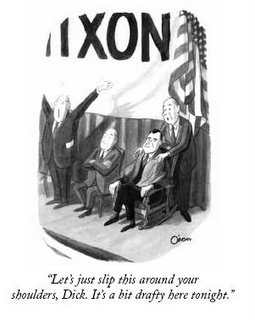People can gesticulate so much that they may end up giving you a bloody nose. Then, there is a constant threat of wild sneezing, a shower of saliva while talking, spitting while chewing pan or a booger hidden in a dark corner. Not to mention loud and irritating conversations on the mobile phones, habit of crossing their legs while sitting very close soiling your trousers with their footwear……….
On a cricket field, a batsman with a big backlift can cause a draft in the slips by waving his bat violently.
Here, speaker on the dais has caused a draft. Giving chills to Richard Nixon.
Btw- Nixon sitting dignified here lost this particular election all right but soon, when elected, his actions would produce a gale called Watergate.

Artist: William O'Brian published The New Yorker Oct 1, 1960
No comments:
Post a Comment